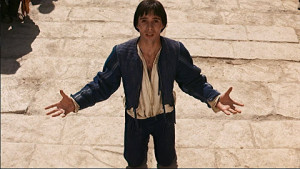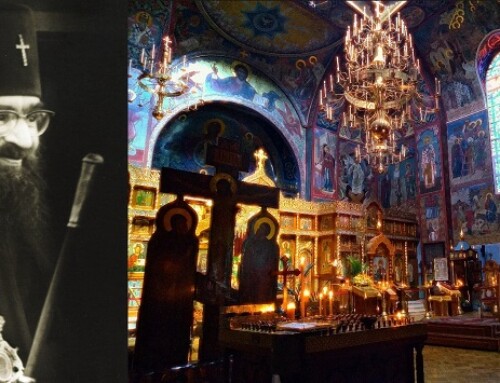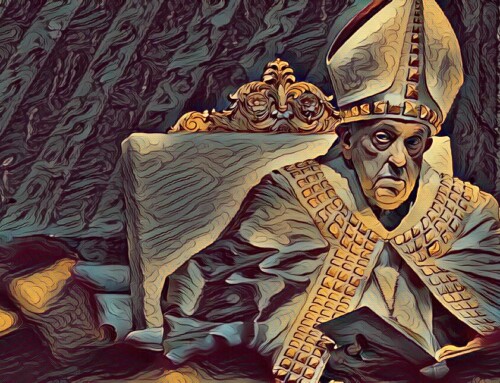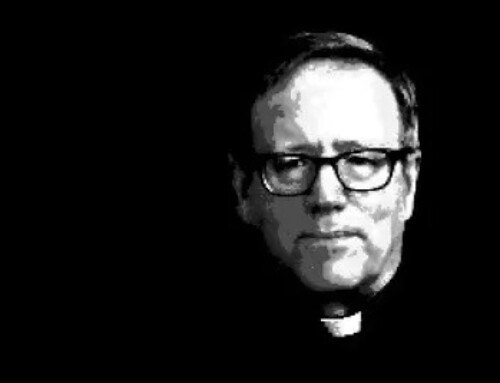
“And they were both naked: to wit, Adam and his wife: and were not ashamed.” (Genesis 2:25)
“Naked came I out of my mother’s womb, and naked shall I return thither: the Lord gave, and the Lord hath taken away: as it hath pleased the Lord so is it done: blessed be the name of the Lord.” (Job 1:21)
“For the word of God is living and effectual, and more piercing than any two edged sword; and reaching unto the division of the soul and the spirit, of the joints also and the marrow, and is a discerner of the thoughts and intents of the heart. Neither is there any creature invisible in his sight: but all things are naked and open to his eyes…” (Hebrews 4:12-13)
In the writings of St. John of the Cross, he often used the term “nakedness.” When first read that, I thought this somewhat cryptic until I recalled one of my favorite subjects for mediation: the 10th Station of the Cross – Jesus is Stripped of His Garments. I have always loved this little fragment from the life of Christ as I believe it takes us directly to the core of Christ’s humanity and His Divinity: the complete and utter suffering endured by His human body, and His willingness to be humiliated for our thankless sake. What John of the Cross was so expertly able to accomplish is the total revealing of how and why we must become naked before the Lord. In his most well-known work, “The Dark Night,” John wrote:
“…the spirit must be simple, pure, and naked as to all natural affections of spirit with the divine wisdom in which, on account of the soul’s purity, the delights of all things are tasted to a certain eminent degree. Without this purgation the soul would be wholly unable to experience the satisfaction of all this abundance of spiritual delight. Only one attachment, or one particular object to which the spirit is actually or habitually bound is enough to hinder the experience or reception of the delicate and intimate delight of the spirit of love that contain eminently in itself all delights.”
This was a revelation to me. For, I had spent much of my post-conversion years acting like Adam expelled from the Garden of Eden: cowering, ashamed, downtrodden, covering and hiding myself from God. I walked around with a massive fig leaf; obscuring my whole body. In Confession, I was not very honest about myself or the past: being overly vague; wording things in a certain way to make me look better; or skipping from one confessor to another in a vain attempt to safeguard my pride. My relationship with Him was bizarre: I was the prodigal son and He the Father who begrudgingly welcomed me back, and now: merely enduring my loathsome presence. I was afraid of Him, and I showed little affection. I kept guarded. My mind was still warped, and my desires disordered. I thought, if He ever found out – I would again be cast into the cold and darkness.
At the time, I was completely uneducated and relying on my attachment to God as the all-powerful and vengeful Lord that saved me from the brink of hell. I feared Him, and knew that I needed Him, but I didn’t really love Him. It took years for me to let-down my guard. This happened slowly, but methodically; mainly through a frequent recitation and mediation upon “The Stations of the Cross” as written by St. Alphonsus Liguori. At first, the prayers were like an endless dirge. I kept repeating: “I repent of having offended Thee. Never permit me to separate myself from Thee again. Grant that I may love Thee always; and then do with me what Thou wilt.” I kept thinking to myself: “What am I doing?” These prayers were meaningless. But, somehow, I remain steadfast. For a reason not known to me, God wanted me at the Cross. He wanted me to get there, and He wanted me to follow him on the journey up to Calvary. I didn’t know why. Finally, at the 10th Station, I prayed: “My innocent Jesus, by the merits of the torment Thou hast felt, help me to strip myself of all affection to things of earth, in order that I may place all my love in Thee, who art so worthy of my love.” Love! How could I love Christ? Then, while meditating, I saw Him beaten, bloodied, and uncovered. How could I not love Him? For, He was like me – ripped to shreds by a cruel and fallen world. At that point, everything dropped away, and I was done. I was done hiding; I was done with the lying; and I was done with the covering up. I knew that I had been holding on: to the past, to my own inflated self-worth, and to the shame. I was tired of carrying all this useless weight around. Instead, I had to give it to Christ. Because, I couldn’t do it. I was broken. In a way, I felt like St. Francis of Assisi: who famously removed all his clothes and gave them to his father. And it felt good. It was tough, but now it was done and over. Afterward, I could move on and start again.
From “The Life of St. Francis of Assisi” by Thomas of Celano:
“When he was brought before the Bishop, he would suffer no delay or hesitation in anything; indeed, he did not wait for any words nor did he speak any, but immediately putting off his clothes and casting them aside, he gave them back to his father. Moreover, not even rationing his trousers, he stripped himself completely naked before all. The bishop, however, sensing his disposition and admiring greatly his fervor and constancy, arose and drew him within his arms and covered him with the mantle he was wearing. He understood clearly that the counsel was of God, and he understood that the actions of the man of God that he had personally witnessed contained a mystery. He immediately, therefore became his helper and cherishing him and encouraging him…Behold, now he wrestles naked with his naked adversary, and having put off everything that is of this world, he thinks only about the things of the Lord. He seeks now to despise his own life, putting off all solicitude for it, that he might find peace in his harassed way, and that meanwhile only the wall of flesh should separate him from the vision of God.”
This incident can mean different things to different people. I believe, for St. Francis, it was his final renunciation of all that tied him to his former life. For, just previous to this incident, the Father of Francis had kidnapped his son, abused him physically and verbally, and chained the future Saint in the family home. Francis’s mother, out of sheer pity, freed him, and this led to his dramatic final act of removing his clothes and handing them to his maniacal father. For me, this signals a letting go: a stripping of all past wrongs done against us; a dropping away of old ties to sin, desires, and disappointments. And, although little is known about the early life of Francis, from the few remaining histories, it appeared to be not only privileged and decadent, but also ignorant and wayward. As Celano wrote: “…he outdid all his contemporaries in vanities and he became a promoter of evil…” Not surprisingly, Francis “…had received little to no instruction in the way of God and in knowledge of him when he was young…” Therefore, in this respect, Francis is a very modern person: reared as a sort of “cultural” Catholic, only paying slight lip-service to religion while partaking in every kind of existing hedonism. Here, I can completely relate, as I was a child during the post-Vatican II era – when the American Catholic parochial system underwent radial restructuring and many of the time-tested theories of education and discipline were abandoned. After leaving Catholic high-school, I new practically nothing. Like Francis, I sought solace in the world. Later, like many of my contemporaries, we were left feeling unfulfilled, dissatisfied, and bitterly used. Francis arrived at that same moment. As St. John of the Cross would later describe, Francis chose “nakedness” before God. Yet, this is not just a matter of pulling off the soiled and tattered, but includes making yourself open and vulnerable before God. Because, as all of us have been continually beaten and buffeted by the world – we tend to become more self-protective and guarded. We keep ourselves safe; and that’s a comfortable position to stay. So, in order to truly leave everything behind us, we must take the chance and Trust in Jesus. Just as Francis did, this requires a radical step: a willingness to make the leap of Faith, to rely on God, and to forget about former ways. And at its core – this requires humility.
St. Francis is quoted as saying: Nudus nudum sequi Christum, “Naked to follow the naked Christ.”
St. Francis once told a reticent Brother Ruffino, a rather shy and retiring monk, to preach in his hometown of Assisi, saying: “Inasmuch as thou hast not obeyed immediately, I command thee to take off thy clock and thy hood and go to Assisi, where thou shalt enter a church and preach to the people; and this shalt thou do out of holy obedience.” Having done this and being jeered at by the public: “[Francis] immediately taking off his clock and his hood with great fervor of spirit, he went to Assisi, taking with him Brother Leo, who carried his mantle and that of Brother Ruffino. The inhabitants of Assisi, seeing him thus accoutered, reviled him, believing that both he and Brother Ruffino were out of their minds through much penance…Then St Francis ascended the pulpit, and began to preach in so wonderful a way on holy penance, on the world, on voluntary poverty, on the hope of life eternal, on the nakedness of Christ and on the shame of the Passion of our Blessed Savior, that all they who heard him, both men and women, began to weep bitterly, being moved to devotion and compunction…”
The sort of “nakedness” described by Francis, in his case, is both a spiritual reality and a physical one. Conversely, in the writings of the Spanish mystic St. John of the Cross, nakedness referred to a spiritual emptying-out of the will and the dis-attachment to the material: “The poor man who is naked will be clothed, and the soul that is naked of desires and whims will be clothed by God with His purity, satisfaction, and will.” Therefore, nakedness has a two-fold effect, for as Francis went about in ragged clothes, or none at all when he famously stripped in front of his Father, the Bishop, and the entire populous of Assisi, in a visible renunciation of all that he once was and represented, it too symbolizes our divorce from all that ties us to the earthly bonds of physical yearnings and passions. And, nakedness also envelopes a sheer acceptance of humility: aligning ourselves with the poverty of the infant Christ and the complete rejection of the will – namely, when we allow ourselves to approach the Cross of Christ on Calvary and freely join our sufferings with that of the Crucified Lord. However, most importantly, at this time of Christmas, to also draw near the cave of Bethlehem, like the poor and scruffy shepherds in their tattered and itchy sackcloth: to ultimately share in the cold and misery experienced by the baby Jesus. Not surprisingly, the Medieval shepherd of Italy, St. Francis, instituted the modern tradition of the Nativity crèche. Therefore, like him, we should cast off all worldly connections to expensive fashion, over-priced and needless electronics, flashy cars, prestigious homes, and distracting and pornographic forms of entertainment; sadly, in the ultimate irony, many such items end up under numerous Christmas trees. Only then, can we come near to Jesus: in our poverty, nakedness, and humility.





